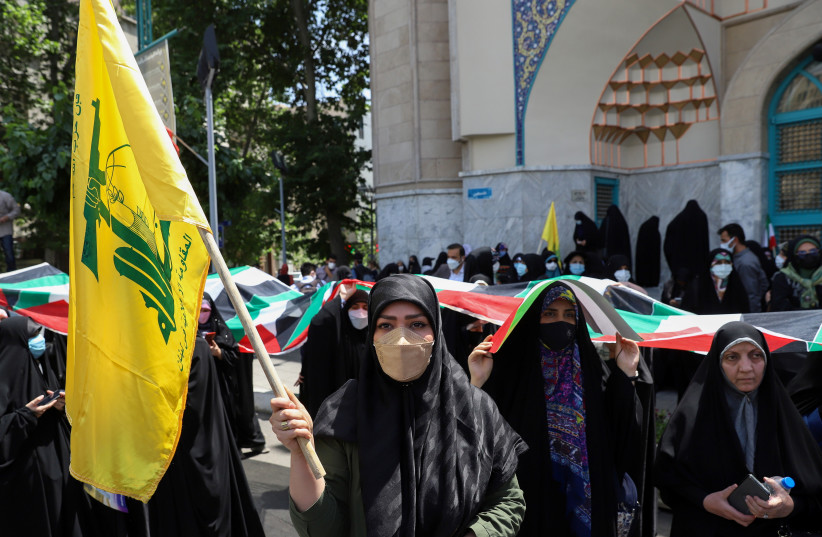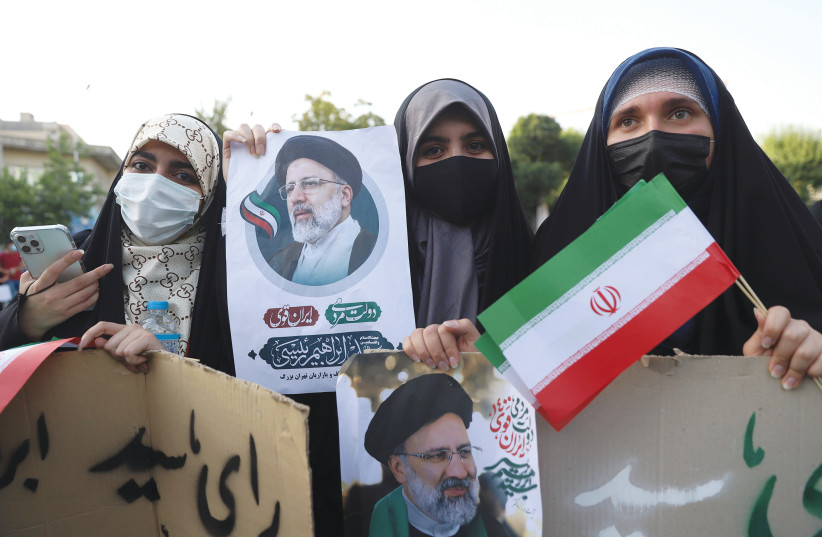Iran believes Israel is under a wider threat than in the past, and brags it could unite Gaza and the “northern front” against Israel. It believes that the West Bank could “explode at any moment.”

Iran, in its usual bluster, is claiming Israel is afraid of a conflict with its “axis of resistance,” the term for the Iranian network of proxies and allies in Lebanon, Syria, Iraq and Yemen.
“It is clear that the Zionist regime is afraid of entering into a military conflict with the resistance on any front, because [Israel] knows that it will face a multifaceted response and that going back to a regional war in Israel will take it back decades and will be a major strategic defeat for the Zionists,” Tasnim News says.
“The scenario of the destruction of Israel in the event of a regional war is now very realistic; especially considering the statements of the leaders of the Axis of Resistance about the necessity of uniting all the fronts of this axis against the enemy.”
Iran has sought to increasingly have its proxies work together.
Often with remarks from Hezbollah leader Hassan Nasrallah, Tehran indicates that it can coordinate between the Houthis in Yemen, Hamas in Gaza, Hezbollah and Iraqi Shi’ite militias.
“The Zionist regime is more concerned about the start of a regional war after the revelation of the regime’s weaknesses on the domestic front and its army, which showed a decrease in the Zionist deterrent power,” the Iran report says, referring to the May conflict between Israel and Hamas. Since then, Israel has drilled for future conflict, and has also recently done joint training with the US.
Tehran assesses that Jerusalem is concerned about a multi-front war.
“The evidence shows that Israel is not even able to resolve its military operations on one front, let alone clashes on several fronts.” This shows that Iran is planning to try to heat up multiple fronts. Oddly, the Islamic Republic claims that Israel “lost five wars with the Axis of Resistance since the July 2006 war with the Lebanese resistance.” It claims Israel lost the May conflict with Hamas.

IRAN BELIEVES Israel is under a wider threat than in the past. It brags it could unite Gaza and the “northern front” against the Jewish state. It believes that the West Bank could “explode at any moment.” Iran also wants to stoke sectarian conflict inside the Green Line, the report says.
“These are related to the strategic threat against the Israeli internal front, and from the external borders, in addition to southern Lebanon, Iraq and Yemen [in which] will be [included] other components of the Israeli threat in the event of a multilateral war. On the other hand, the increase of Iran’s military and technological power adds to this concern of the Zionists.”
Iran seems to have revealed its plans in this report. It says that Hezbollah coordinated intelligence with Hamas in Gaza during the May conflict. “He stated that a high level of coordination was observed between the various members of the resistance during the Battle of the Sword of Quds [the May conflict].”
Iran also wants to unite various Palestinian groups and stoke violence in Israel and the West Bank. “The Zionist enemy fears an increase in the military strength of the resistance forces in the region and believes that in the event of a regional war, the skies of occupied Palestine will be filled with thousands of missiles and attack drones from anywhere in the occupied territories – from north to south and east to west.”
Tehran claims to know that Jerusalem is not prepared for a conflict by reading reports in Israeli media and think tanks. “On the Lebanese front, the Zionist enemy is seeking to test the deterrent power of the resistance. A few months ago, it tried to change the rules of engagement with Hezbollah and, for the first time in 15 years, targeted areas on Lebanese soil that met with an immediate Hezbollah response.” The claims here seem to relate to incidents in 2018 and in 2020.
“On the other hand, Israel still hopes for unprecedented security and intelligence cooperation with the Arab regimes with which it recently signed a normalization agreement.” Iran also claims Israel is stoking tensions between Saudi Arabia and Lebanon.
“On the Syrian front, the Zionist regime is trying to send threatening messages to the Axis of Resistance by intensifying its aggression, but the recent attack on the US base in Al-Tanf in the border triangle of Jordan, Syria and Iraq disrupted these calculations of the Zionists,” the report says.
As reported by The Jerusalem Post
